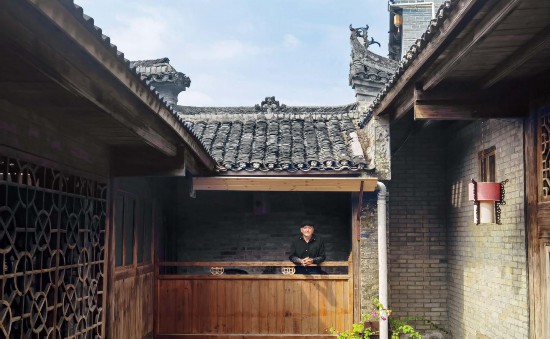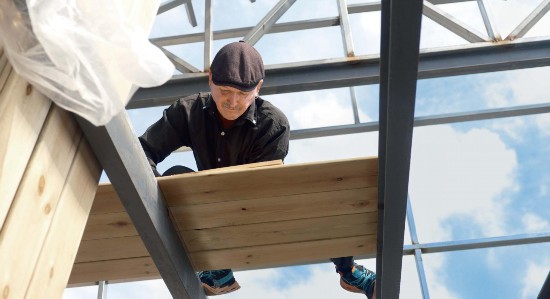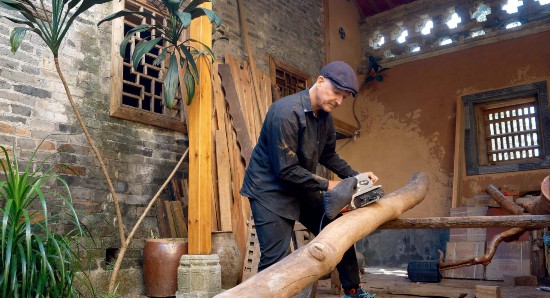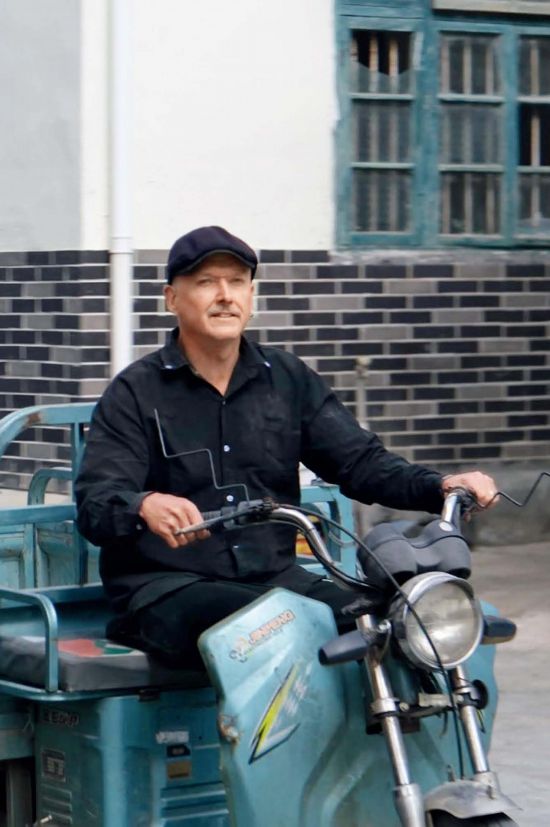
In October 2024, Hamlinton was interviewed by Global People Magazine in Yangshuo.
Ian Hamlinton, Born in the United Kingdom in 1970, Ian Hamlinton moved to South Africa with his family at the age of two. In 2001, he arrived in China and settled in Yangshuo, Guangxi. Over the years, he has been involved in restoring more than 20 traditional Chinese residences.
In October, a reporter from Global People visited Jiuxian Village in Baisha Town, Yangshuo County, Guilin, Guangxi. Walking past golden rice fields and breathing in the sweet scent of osmanthus blossoms, they arrived at a tranquil village nestled against the hills. Rows of old buildings exuded a rustic charm and a sense of history.
However, this "traditional village" is anything but conventional. Inside the beautifully preserved historic structures are modern coffee houses, Western-style restaurants, bars—and a boutique guesthouse called "Secret Garden." This is where Ian Hamlinton, a South African architectural designer, began his "Chinese Dream."
Since arriving in Guangxi in 2001, Hamlinton has been involved in restoring over 20 traditional Chinese residences. For his contributions, he was awarded the "Golden Silkball Friendship Award" by the Guangxi Zhuang Autonomous Region government. Fully immersed in the idyllic Chinese countryside lifestyle, Hamlinton has become a local legend, affectionately known as "Crazy Eagle."
On this day, following the steps of "Crazy Eagle," the Global People reporter once again delved into the world of China's ancient architecture, experiencing the essence of rural life.
"Life is like a river"
"Good morning!" At 9 a.m., just as the reporter arrived, a booming greeting came from behind. Turning around, they looked up to see a blond-haired, blue-eyed foreigner perched on the steel frame of a third-floor beam, working like a real-life Spider-Man. This was in Yulongbao Village, Baisha Town, where Ian Hamlinton was busy restoring an ancient residence.
As the saying goes, "Building a house is easier than repairing one." The old house stood on low ground and had been submerged by floodwaters in the past. Years of neglect had left it riddled with safety hazards. As both chief designer and "foreman," Hamlinton personally led the restoration effort. Along with his team, he reinforced the entire structure with steel columns, then carefully restored the house to its original appearance. "The challenge lies in maintaining the traditional look while meeting modern living standards—it's a lot of work," a villager involved in the project told Global People with a smile.
Hamlinton's story in China began in 2001. That year, while working as a tour guide in China, he visited Yangshuo for the first time. During a cycling trip, he accidentally stumbled upon Jiuxian Village. Nestled in the embrace of mountains, the tranquil village featured ancient buildings with overhanging eaves, gray bricks, and green tiles—a beauty that left him speechless. It was Hamlinton's first time encountering southern-style courtyard houses, which until then he had only seen in architectural textbooks. At the time, many young and middle-aged villagers had left Jiuxian to seek work elsewhere, leaving the old houses abandoned and in disrepair. As Hamlinton wandered through the village, pushing aside overgrown weeds, he came across a deserted Chinese courtyard. Only one phrase came to mind: Secret Garden.
"I often read a book called The Secret Garden when I was in South Africa," Hamlinton recalled. "It's a story about three children who find healing and growth through a magical garden." Inspired by the story, a bold idea took root in his mind—he decided to rent the old courtyard house. "These beautiful historic buildings deserve attention. I wanted to prove that old houses can still hold immense value."
At the time, Hamlinton's Chinese was limited, so he sought help from his Chinese friend William, asking him to negotiate with the property owner. However, the house was already under lease, and Hamlinton had to leave disappointed. Yet, he couldn't let go of his vision. Years later, he approached the owner again, but the process was still fraught with challenges. "At that moment, I realized I needed to master Chinese," he said.
In 2008, Hamlinton learned that a local from Guangxi, who had settled in Guilin, had opened a Chinese language school. Without hesitation, he enrolled.
By the time Hamlinton returned to Jiuxian Village in 2009, he was fluent in Chinese. Invited by a French friend to assist in building a "country estate," Hamlinton grew familiar with the locals and gained support from the local government. Finally, he succeeded in leasing the courtyard house for 20 years.
Hamlinton began restoring the property with meticulous care, adhering to the principle of "repairing the old as it was." He plastered mud over the crumbling walls and used reclaimed timber to mend broken beams. At the same time, he sought to modernize the house to meet contemporary living needs. To improve natural lighting, he proportionally enlarged the windows. To solve the drainage issues, he leased additional land to build a septic tank.

Hamlinton's unique guesthouse, "Secret Garden" (by Zhu Jiaqi)
In 2011, driven by the heartfelt wish that "more people could find healing in China's ancient residences," Hamlinton officially opened his "Secret Garden" guesthouse. He still vividly remembers the Spring Festival of 2012, when out-of-town guests booked six rooms. Upon checking in, they said excitedly, "Thank you for giving us the feeling of home, even far from home."
"At the time, many people didn't understand why a penniless foreigner like me insisted on spending money to rent an abandoned old house," Hamlinton said with a hearty laugh. "They all thought I was crazy. And since my English name, Ian, sounds similar to the Chinese word for 'eagle,' they started calling me 'Crazy Eagle.' I've been lively and restless since I was a kid, so I love the nickname—it shows I'm not one to do things the usual way!"
This marked a new chapter in Hamlinton's "Chinese Dream." Since then, he has dedicated himself to restoring ancient architecture in the Yangshuo countryside, working on both his own leased properties and restoration projects for others.
Reflecting on his journey, Hamlinton remarked, "Life is like a river—you never know where it will take you. I never imagined that I'd end up doing so much in rural China. Fate is truly incredible!"
"I've gradually grown more grounded."
At 10 a.m., Hamlinton paused his work to take a break. He took a couple of bites from the steamed sweet potato he had brought to the site when a voice outside called, “Crazy!” Hamlinton responded and stepped out to find a villager seeking advice on restoration techniques. For Hamlinton, an architect, such scenes have become a regular part of life.
Hamlinton's love for art and architecture dates back to his childhood. Born in the United Kingdom in 1970, his life took a new turn at the age of two when his father's oil company expanded operations to South Africa. The family relocated to Durban, beginning a new chapter.
From starting primary school at five to graduating high school at 17, Hamlinton was always the youngest in his grade. "In South Africa, we had to start planning our careers in high school," he explained. Art was Hamlinton's strongest subject, and he dreamed of becoming a painter. However, his family, teachers, and friends had other ideas. "They thought it was a pity for someone good at math and other subjects to focus solely on painting. They encouraged me to study architecture instead," he recalled.
Thus, Hamlinton's bond with architecture was formed. While studying architecture in university, Hamlinton took a course on "Chinese Architectural Feng Shui Culture." In the textbook, he saw pictures of Beijing's traditional courtyard houses and for the first time became curious about Chinese architecture. "Some regions of South Africa have a climate similar to China, so a courtyard house would be perfect for the weather there. However, South Africa doesn't have such buildings. So, I thought, how wonderful it would be to live in one of these houses!" Hamlinton recalled.
After graduating from university, Hamlinton worked as an architect in South Africa for three years. However, he found that working in front of a computer all day wasn't what he truly wanted. A free spirit at heart, he embarked on a period of travel. During this time, he met a friend working for a travel company. In the early 2000s, the company decided to expand into China, and Hamlinton, without hesitation, signed up. Thus, he came to China and became a tour guide.
Reflecting on the world's perception of China during that time, Hamlinton felt frustrated. "Back then, many people had no understanding of China. They told me that Chinese people lacked culture and manners. But when I arrived in China, I discovered that this was all just a rumor."
Through countless restorations of ancient residences, Hamlinton was deeply impressed by Chinese culture. He marveled at the wisdom embedded in China's ancient architecture: "These brick and tile structures keep the house warm in winter and cool in summer, and they allow you to feel connected with nature, making them more comfortable than many modern homes." He also learned many fascinating Chinese customs. "Chinese brothers told me that the main door shouldn't face the stairs, and I believe this reflects ancient wisdom."
Hamlinton himself also grew during this time. "I used to have little patience, but living alongside the mountains and rivers of Yangshuo, whether restoring houses or doing other things, I gradually became more grounded," he said.
To restore the ancient residences, Hamlinton nearly exhausted all his savings. From design to hands-on work, he did everything himself, and occasional accidents, like falling from heights, happened. "My parents always worried about me, thinking I had no money and was working too hard. They were against it at first. But later, my mother came to Yangshuo, saw the beauty of these buildings with her own eyes, felt the villagers' warmth, and was so moved that she cried, repeatedly saying 'It's wonderful.'" Hamlinton laughed as he told the reporter, "I've always enjoyed it and never felt it was hard work."


Hamlinton working on-site to renovate ancient homes.
"China is a place where you can truly pursue your career."
On the morning of the interview, around 11:30 a.m., we were about to head back to the "Secret Garden" from the construction site. We had arranged to meet Global People reporters at our destination, but as soon as the electric tricycle left the alley, Hamlinton took a turn and came back. "I know a scenic little path. Let me take you to experience it!"
The tricycle wound its way through the village roads, and the view suddenly opened up, revealing the unique karst mountains, the wide Yulong River, and the bountiful fields.
Villager: "Crazy!"
Hamlinton: "Cha beng ya!" (a local dialect expression meaning "Are you having lunch?")
Villager: "Crazy, let's have a drink tonight."
Raft workers on the river, farmers at work, elderly men enjoying the shade, women cycling, and men at the village entrance—all greeted us with warm smiles. The sunlight bathed the earth, and the cool autumn breeze met us head-on, with Hamlinton and the villagers exchanging enthusiastic greetings.
"I really love the Chinese countryside. South Africa doesn't have mountains like this, nor does it have such brothers and sisters," Hamlinton said, chatting as he rode. "Everyone here always thinks of me. Just the other day, I went to a village man's wedding to drink and celebrate."

Hamlinton was riding his electric tricycle.
"Those who love others are loved in return." With the help of the village Party secretary and the villagers, Hamlinton's career has grown more successful. He even made his mark in the Chengyang Eight Villages Scenic Area in Sanjiang Dong Autonomous County, Liuzhou. "Dong-style wooden houses are made without a single nail, yet they are strong and beautiful. When they move, they can even dismantle the wood and carry it away piece by piece," Hamlinton said. A few years ago, when he heard that a centuries-old Dong wooden house was about to be abandoned, Hamlinton's friend contacted him, and together they rented the house and began the restoration. Today, the Dong wooden house has been transformed into a guesthouse, now open to the public.
"China is a great place to build a career," Hamlinton, who has worked in architectural design in both the UK and South Africa, shared from his experience. "In foreign countries, building is very limited and quite boring. But in China, I can fully express myself, design and decorate on my own, and it's especially enjoyable."
Hamlinton continued, "In China, I never feel like a foreigner. No one has ever excluded me for looking different. The overall economic situation in China is also good, so I'm never worried about not finding work." What surprised Hamlinton even more was that he never expected to participate in the village's collective meetings and be involved in discussions about village affairs. "We talk about how to develop tourism and how to promote the village. Over the years, the village has indeed developed more and more, with growing popularity. The young people who once went to other provinces to work have come back, and the old houses that were once neglected have now become highly sought-after. Many rural areas abroad don't have such a sense of unity."
"I once told the local government about insufficient visitors, and they kept helping with promotion and introducing guests. This is unimaginable in other countries," Hamlinton remarked. "In the UK, I barely knew any public officials. But in China, you can even interact with government officials as if they were friends."
Hamlinton is not the only foreigner enjoying life in rural China. In fact, his tricycle was a gift from a Dutch friend who also lived in the Yangshuo countryside. "There are always plenty of opportunities in China. Foreigners here can work as teachers, outdoor guides, bar musicians, or rock-climbing instructors... I have many foreign friends who work in Yangshuo while enjoying life," Hamlinton explained.
When the Global People reporter visited "Secret Garden," it happened to be lunchtime, and streams of domestic and international tourists were coming in—some to tour, others to relax. "Foreigners enjoy tourism that lets them deeply experience local culture—staying in traditional houses, interacting with locals, and eating local specialties. Many of our guests tell me their two or three days at 'Secret Garden' are the happiest memories of their trip," Hamlinton said.
After living in China for over 20 years, Hamlinton jokingly calls himself a native of Jiuxian Village. "I've never felt lonely. The villagers know I live alone and often bring me food," he said. "This kind of experience is hard to find in any other country. Chinese people think from a collective perspective, and this sense of proud community belonging is a unique charm of Chinese culture."
When asked about his future plans, Hamlinton answered without hesitation, "I love rural China. My brothers and sisters are here, and I plan to stay here forever."
(Intern Hou Fangying contributed to this story.)
 Editor:Cai xiaohui
Editor:Cai xiaohui